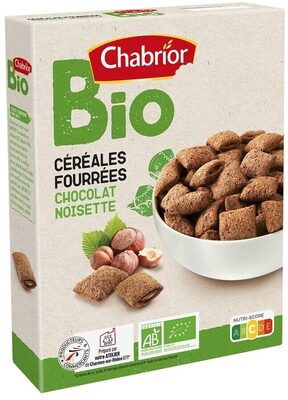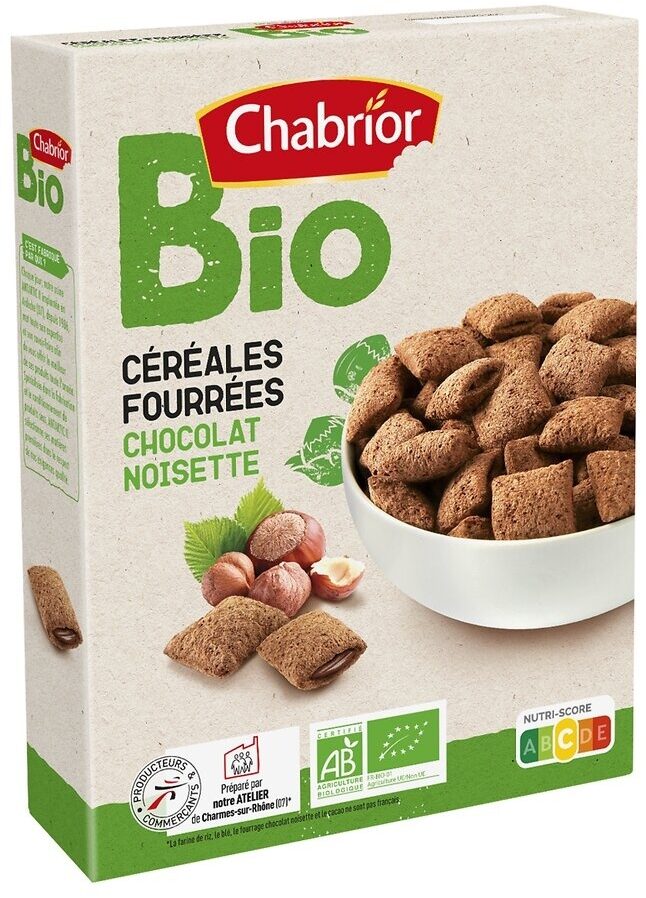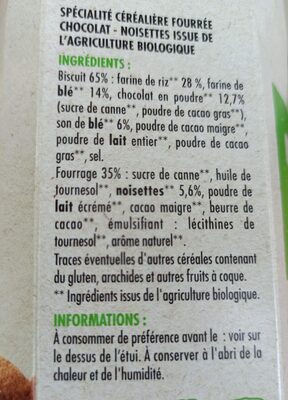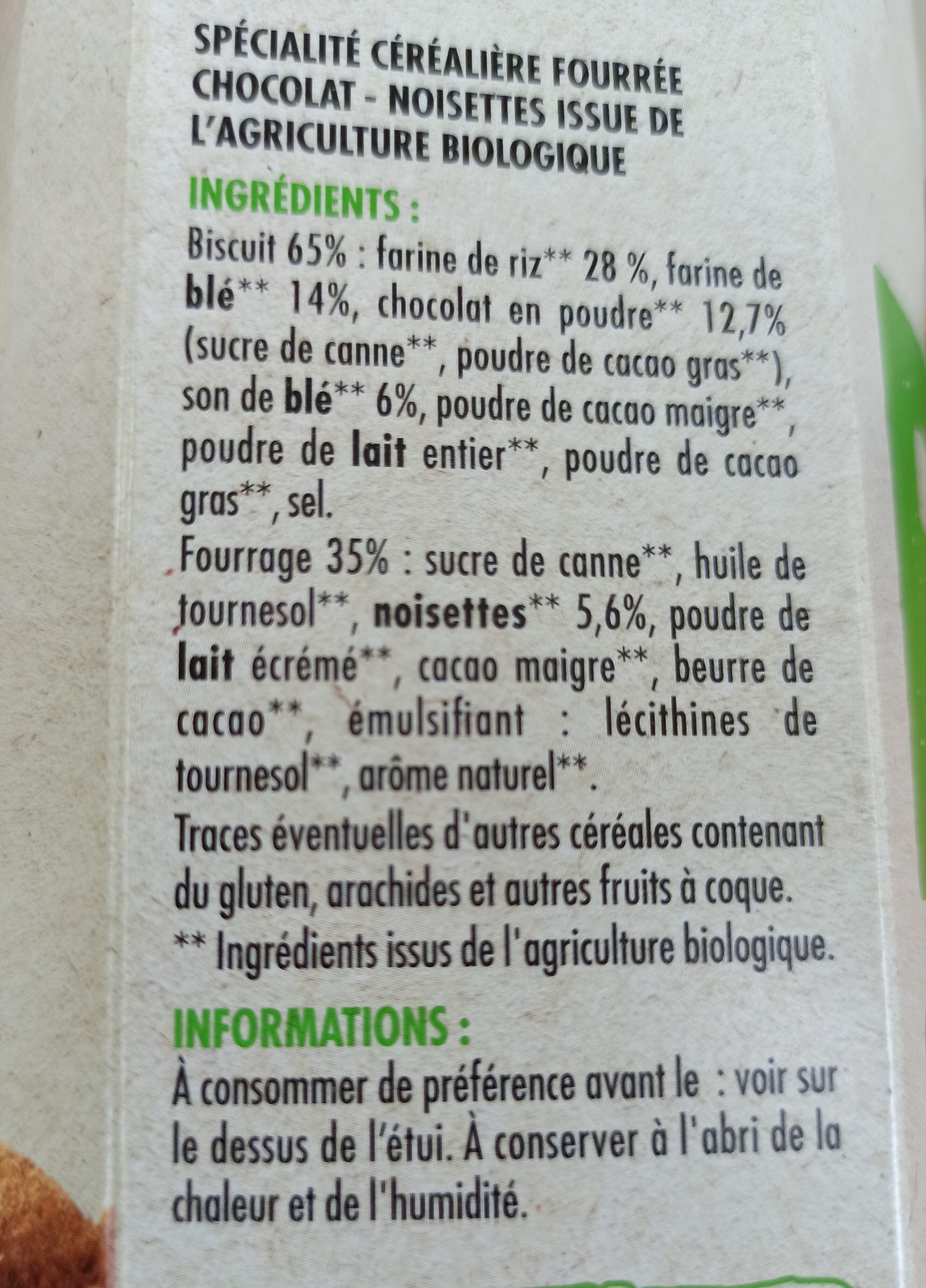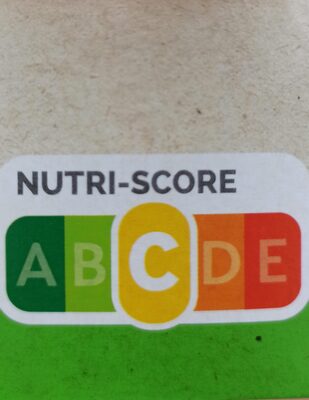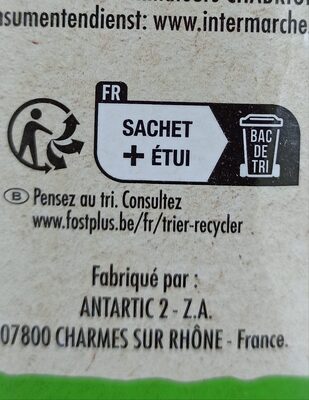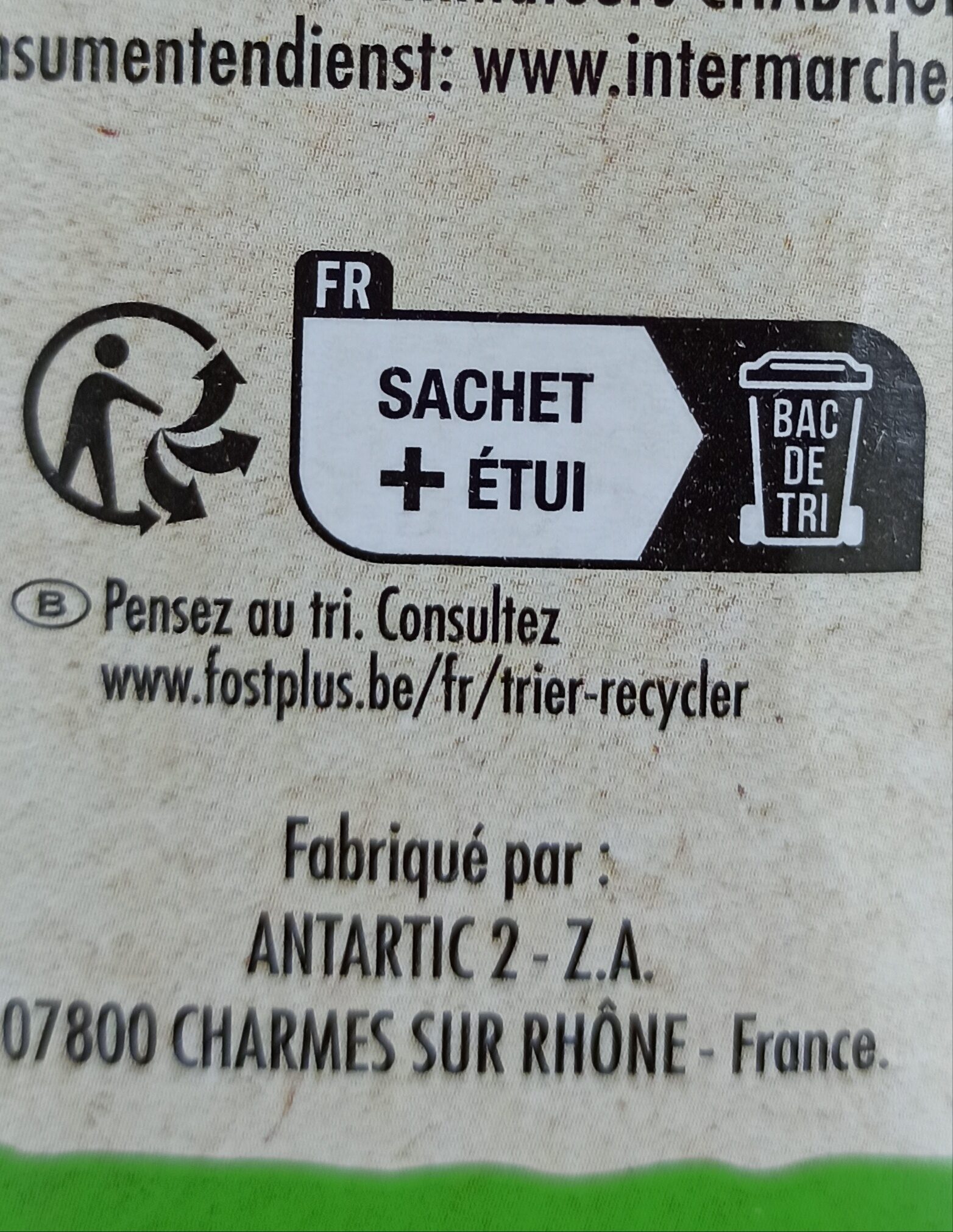Help us make food transparency the norm!
As a non-profit organization, we depend on your donations to continue informing consumers around the world about what they eat.
The food revolution starts with you!
Céréales fourrées chocolat noisette bio - Chabrior - 375 g
Céréales fourrées chocolat noisette bio - Chabrior - 375 g
This product page is not complete. You can help to complete it by editing it and adding more data from the photos we have, or by taking more photos using the app for Android or iPhone/iPad. Thank you!
×
Some of the data for this product has been provided directly by the manufacturer .
Barcode: 3250392614959 (EAN / EAN-13)
Common name: Bio céréales fourrées chocolat noisette
Quantity: 375 g
Brands: Chabrior
Categories: Plant-based foods and beverages, Plant-based foods, Breakfasts, Cereals and potatoes, Cereals and their products, Breakfast cereals, Chocolate cereals, Extruded cereals, Filled cereals
Labels, certifications, awards:
Organic, EU Organic, Non-EU Agriculture, EU Agriculture, EU/non-EU Agriculture, FR-BIO-01, Nutriscore, Nutriscore Grade C, AB Agriculture Biologique

Stores: intermarché, INTERMARCHE FRANCE
Countries where sold: France
Matching with your preferences
Health
Ingredients
-
21 ingredients
French: Biscuit 65% : farine de riz**28 %, farine de blé** 14%,chocolat en poudre** 12.7% (sucre de canne**, poudre de cacao gras**), son deblé** 6%, poudre de cacao maigre**, poudre de lait entier**, poudre de cacaogras**, sel. Fourrage 35% : sucre de canne**, huile de tournesol**, noisettes**5,6%, poudre de lait écrémé**, cacao maigre**, beurre de cacao**,émulsifiant : lécithines de tournesol**, arôme naturel**.Allergens: Gluten, Milk, Nuts, fr:noisettes-corylus-avellanaTraces: Gluten, fr:arachides-et-autres-fruits-a-coque-ingredients-issus-de-l-agriculture-biologique
Food processing
-
Ultra processed foods
Elements that indicate the product is in the 4 - Ultra processed food and drink products group:
- Additive: E322 - Lecithins
- Ingredient: Emulsifier
- Ingredient: Flavouring
Food products are classified into 4 groups according to their degree of processing:
- Unprocessed or minimally processed foods
- Processed culinary ingredients
- Processed foods
- Ultra processed foods
The determination of the group is based on the category of the product and on the ingredients it contains.
Additives
-
E322 - Lecithins
Lecithins are natural compounds commonly used in the food industry as emulsifiers and stabilizers.
Extracted from sources like soybeans and eggs, lecithins consist of phospholipids that enhance the mixing of oil and water, ensuring smooth textures in various products like chocolates, dressings, and baked goods.
They do not present any known health risks.
-
E322i - Lecithin
Lecithins are natural compounds commonly used in the food industry as emulsifiers and stabilizers.
Extracted from sources like soybeans and eggs, lecithins consist of phospholipids that enhance the mixing of oil and water, ensuring smooth textures in various products like chocolates, dressings, and baked goods.
They do not present any known health risks.
Ingredients analysis
-
Palm oil free
No ingredients containing palm oil detected
Unrecognized ingredients: fr:poudre-de-cacao-gras, fr:son-deble, fr:poudre-de-cacaograsSome ingredients could not be recognized.
We need your help!
You can help us recognize more ingredients and better analyze the list of ingredients for this product and others:
- Edit this product page to correct spelling mistakes in the ingredients list, and/or to remove ingredients in other languages and sentences that are not related to the ingredients.
- Add new entries, synonyms or translations to our multilingual lists of ingredients, ingredient processing methods, and labels.
If you would like to help, join the #ingredients channel on our Slack discussion space and/or learn about ingredients analysis on our wiki. Thank you!
-
Non-vegan
Non-vegan ingredients: Whole milk powder, Skimmed milk powderSome ingredients could not be recognized.
We need your help!
You can help us recognize more ingredients and better analyze the list of ingredients for this product and others:
- Edit this product page to correct spelling mistakes in the ingredients list, and/or to remove ingredients in other languages and sentences that are not related to the ingredients.
- Add new entries, synonyms or translations to our multilingual lists of ingredients, ingredient processing methods, and labels.
If you would like to help, join the #ingredients channel on our Slack discussion space and/or learn about ingredients analysis on our wiki. Thank you!
-
Vegetarian status unknown
Unrecognized ingredients: Biscuit, fr:poudre-de-cacao-gras, fr:son-deble, fr:poudre-de-cacaograsSome ingredients could not be recognized.
We need your help!
You can help us recognize more ingredients and better analyze the list of ingredients for this product and others:
- Edit this product page to correct spelling mistakes in the ingredients list, and/or to remove ingredients in other languages and sentences that are not related to the ingredients.
- Add new entries, synonyms or translations to our multilingual lists of ingredients, ingredient processing methods, and labels.
If you would like to help, join the #ingredients channel on our Slack discussion space and/or learn about ingredients analysis on our wiki. Thank you!
-
Details of the analysis of the ingredients
We need your help!
Some ingredients could not be recognized.
We need your help!
You can help us recognize more ingredients and better analyze the list of ingredients for this product and others:
- Edit this product page to correct spelling mistakes in the ingredients list, and/or to remove ingredients in other languages and sentences that are not related to the ingredients.
- Add new entries, synonyms or translations to our multilingual lists of ingredients, ingredient processing methods, and labels.
If you would like to help, join the #ingredients channel on our Slack discussion space and/or learn about ingredients analysis on our wiki. Thank you!
fr: Biscuit 65% (farine de riz**), farine de blé 14%, chocolat en poudre 12.7% (sucre de canne, poudre de cacao gras), son deblé 6%, poudre de cacao maigre, poudre de lait entier, poudre de cacaogras, sel, Fourrage 35% (sucre de canne), huile de tournesol, noisettes**, poudre de lait écrémé, cacao maigre, beurre de cacao, émulsifiant (lécithines de tournesol), arôme naturel- Biscuit -> en:biscuit - ciqual_food_code: 24000 - percent: 65
- farine de riz** -> en:rice-flour - vegan: yes - vegetarian: yes - ciqual_food_code: 9520
- farine de blé -> en:wheat-flour - vegan: yes - vegetarian: yes - ciqual_proxy_food_code: 9410 - percent: 14
- chocolat en poudre -> en:chocolate-powder - vegan: maybe - vegetarian: yes - ciqual_food_code: 18101 - percent: 12.7
- sucre de canne -> en:cane-sugar - vegan: yes - vegetarian: yes - ciqual_proxy_food_code: 31016
- poudre de cacao gras -> fr:poudre-de-cacao-gras
- son deblé -> fr:son-deble - percent: 6
- poudre de cacao maigre -> en:fat-reduced-cocoa-powder - vegan: yes - vegetarian: yes - ciqual_food_code: 18100
- poudre de lait entier -> en:whole-milk-powder - vegan: no - vegetarian: yes - ciqual_food_code: 19021
- poudre de cacaogras -> fr:poudre-de-cacaogras
- sel -> en:salt - vegan: yes - vegetarian: yes - ciqual_food_code: 11058
- Fourrage -> en:filling - vegan: maybe - vegetarian: maybe - percent: 35
- sucre de canne -> en:cane-sugar - vegan: yes - vegetarian: yes - ciqual_proxy_food_code: 31016
- huile de tournesol -> en:sunflower-oil - vegan: yes - vegetarian: yes - from_palm_oil: no - ciqual_food_code: 17440
- noisettes** -> en:hazelnut - vegan: yes - vegetarian: yes - ciqual_food_code: 15004
- poudre de lait écrémé -> en:skimmed-milk-powder - vegan: no - vegetarian: yes - ciqual_food_code: 19054
- cacao maigre -> en:fat-reduced-cocoa - vegan: yes - vegetarian: yes - ciqual_proxy_food_code: 18100
- beurre de cacao -> en:cocoa-butter - vegan: yes - vegetarian: yes - ciqual_food_code: 16030
- émulsifiant -> en:emulsifier
- lécithines de tournesol -> en:sunflower-lecithin - vegan: yes - vegetarian: yes
- arôme naturel -> en:natural-flavouring - vegan: maybe - vegetarian: maybe
Nutrition
-
Average nutritional quality
⚠ ️Warning: the amount of fruits, vegetables and nuts is not specified on the label, it was estimated from the list of ingredients: 0This product is not considered a beverage for the calculation of the Nutri-Score.
Positive points: 5
- Proteins: 5 / 5 (value: 9.7, rounded value: 9.7)
- Fiber: 5 / 5 (value: 8.6, rounded value: 8.6)
- Fruits, vegetables, nuts, and colza/walnut/olive oils: 0 / 5 (value: 0, rounded value: 0)
Negative points: 14
- Energy: 5 / 10 (value: 1789, rounded value: 1789)
- Sugars: 6 / 10 (value: 28, rounded value: 28)
- Saturated fat: 2 / 10 (value: 2.6, rounded value: 2.6)
- Sodium: 1 / 10 (value: 148, rounded value: 148)
The points for proteins are not counted because the negative points are greater or equal to 11.
Nutritional score: (14 - 5)
Nutri-Score:
-
Nutrient levels
-
Fat in moderate quantity (14%)
What you need to know- A high consumption of fat, especially saturated fats, can raise cholesterol, which increases the risk of heart diseases.
Recommendation: Limit the consumption of fat and saturated fat- Choose products with lower fat and saturated fat content.
-
Saturated fat in moderate quantity (2.6%)
What you need to know- A high consumption of fat, especially saturated fats, can raise cholesterol, which increases the risk of heart diseases.
Recommendation: Limit the consumption of fat and saturated fat- Choose products with lower fat and saturated fat content.
-
Sugars in high quantity (28%)
What you need to know- A high consumption of sugar can cause weight gain and tooth decay. It also augments the risk of type 2 diabetes and cardio-vascular diseases.
Recommendation: Limit the consumption of sugar and sugary drinks- Sugary drinks (such as sodas, fruit beverages, and fruit juices and nectars) should be limited as much as possible (no more than 1 glass a day).
- Choose products with lower sugar content and reduce the consumption of products with added sugars.
-
Salt in moderate quantity (0.37%)
What you need to know- A high consumption of salt (or sodium) can cause raised blood pressure, which can increase the risk of heart disease and stroke.
- Many people who have high blood pressure do not know it, as there are often no symptoms.
- Most people consume too much salt (on average 9 to 12 grams per day), around twice the recommended maximum level of intake.
Recommendation: Limit the consumption of salt and salted food- Reduce the quantity of salt used when cooking, and don't salt again at the table.
- Limit the consumption of salty snacks and choose products with lower salt content.
-
-
Nutrition facts
Nutrition facts As sold
for 100 g / 100 mlAs sold
per serving (45 g)Compared to: Filled cereals Energy 1,789 kj
(426 kcal)805 kj
(192 kcal)-2% Fat 14 g 6.3 g +1% Saturated fat 2.6 g 1.17 g -29% Carbohydrates 61 g 27.4 g -10% Sugars 28 g 12.6 g +3% Fiber 8.6 g 3.87 g +79% Proteins 9.7 g 4.36 g +31% Salt 0.37 g 0.167 g -38% Fruits‚ vegetables‚ nuts and rapeseed‚ walnut and olive oils (estimate from ingredients list analysis) 0 % 0 %
Environment
-
Eco-Score C - Moderate environmental impact
⚠ ️Select a country in order to include the full impact of transportation.The Eco-Score is an experimental score that summarizes the environmental impacts of food products.→ The Eco-Score was initially developped for France and it is being extended to other European countries. The Eco-Score formula is subject to change as it is regularly improved to make it more precise and better suited to each country.Life cycle analysis
-
Average impact of products of the same category: C (Score: 45/100)
Category: Breakfast cereals, mix of puffed or extruded cereals, fortified with vitamins and chemical elements
Category: Breakfast cereals, mix of puffed or extruded cereals, fortified with vitamins and chemical elements
- PEF environmental score: 0.63 (the lower the score, the lower the impact)
- including impact on climate change: 3.50 kg CO2 eq/kg of product
Stage Impact Agriculture
78.9 %Processing
12.6 %Packaging
3.8 %Transportation
3.9 %Distribution
0.8 %Consumption
0.0 %
Bonuses and maluses
-
Labels with high environmental benefits
Bonus: +15
-
AB Agriculture Biologique
Organic agriculture contributes to preserve biodiversity, climate, water quality and soil fertility.
Organic food is food produced by methods complying with the standards of organic farming and features practices that cycle resources, promote ecological balance, and conserve biodiversity.
-
EU Organic
Organic agriculture contributes to preserve biodiversity, climate, water quality and soil fertility.
Organic food is food produced by methods complying with the standards of organic farming and features practices that cycle resources, promote ecological balance, and conserve biodiversity.
-
-
Missing origins of ingredients information
Malus: -5
⚠ ️ The origins of the ingredients of this product are not indicated.
If they are indicated on the packaging, you can modify the product sheet and add them.
If you are the manufacturer of this product, you can send us the information with our free platform for producers.
-
Packaging with a medium impact
Malus: -9
Shape Material Recycling Impact 1 Bag LDPE 4 - Low-density polyethylene High 1 Sleeve Non-corrugated cardboard Low
Eco-Score for this product
-
Impact for this product: C (Score: 46/100)
Product: Céréales fourrées chocolat noisette bio - Chabrior - 375 g
Life cycle analysis score: 45
Sum of bonuses and maluses: +1
Final score: 46/100
-
Carbon footprint
-
Equal to driving 1.8 km in a petrol car
350 g CO² per 100g of product
The carbon emission figure comes from ADEME's Agribalyse database, for the category: Breakfast cereals, mix of puffed or extruded cereals, fortified with vitamins and chemical elements (Source: ADEME Agribalyse Database)
Stage Impact Agriculture
68.8 %Processing
15.3 %Packaging
8.0 %Transportation
7.3 %Distribution
0.6 %Consumption
0.0 %
Packaging
-
Packaging with a medium impact
-
Packaging parts
1 x Bag (LDPE 4 - Low-density polyethylene: 8.5 g)
1 x Sleeve (Non-corrugated cardboard: 33 g)
-
Packaging materials
Material % Packaging weight Packaging weight per 100 g of product Paper or cardboard 79.5% 33 g 8.8 g Plastic 20.5% 8.5 g 2.3 g Total 100% 41.5 g 11.1 g
-
Transportation
-
Origins of ingredients
Missing origins of ingredients information
⚠ ️ The origins of the ingredients of this product are not indicated.
If they are indicated on the packaging, you can modify the product sheet and add them.
If you are the manufacturer of this product, you can send us the information with our free platform for producers.Add the origins of ingredients for this product Add the origins of ingredients for this product
Labels
-
AB Agriculture Biologique
Organic agriculture contributes to preserve biodiversity, climate, water quality and soil fertility.
Organic food is food produced by methods complying with the standards of organic farming and features practices that cycle resources, promote ecological balance, and conserve biodiversity.
-
EU Organic
Organic agriculture contributes to preserve biodiversity, climate, water quality and soil fertility.
Organic food is food produced by methods complying with the standards of organic farming and features practices that cycle resources, promote ecological balance, and conserve biodiversity.
Report a problem
-
Incomplete or incorrect information?
Category, labels, ingredients, allergens, nutritional information, photos etc.
If the information does not match the information on the packaging, please complete or correct it. Open Food Facts is a collaborative database, and every contribution is useful for all.
Data sources
Product added on by kiliweb
Last edit of product page on by jusdekiwi.
Product page also edited by corrigo, desan, openfoodfacts-contributors, org-les-mousquetaires, packbot, roboto-app, smoothie-app, tadjieulna, yuka.WllJZVRwd3psOHNFbzhZQXpnamsvWWdyL0wzM1lrS3lGYkUrSUE9PQ, yuka.sY2b0xO6T85zoF3NwEKvlmlsTNX-owPHMjX5oHbT6s-iBbO5P9hzvYajHqs.
